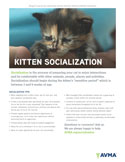Socialization of dogs and cats
What is socialization?
Socialization is the process of preparing a dog or cat to enjoy interactions and be comfortable with other animals, people, places and activities. Ideally, socialization should begin during the "sensitive period" which is between 3 and 14 weeks of age for puppies, and 3 and 9 weeks of age for kittens.
Advice to new puppy and kitten owners
Adopting a new kitten or puppy is a wonderful and exciting experience. It is also a time where a little extra planning can help a new pet develop the calm and confident temperament that will help them enjoy life to the fullest. The basic tennets of socialization are outlined below. The AVMA will be developing tools to help veterinarians and their clients create simple and fun plans tailored to the developmental needs of puppies and kittens in their first weeks and months of life.
- When adopting a puppy or kitten, ask for a pre- and post-adoption socialization plan.
- Create a socialization plan specifically for your dog or cat to prepare him or her for life in your household. Plan exposures to the animals, individuals, environments, activities and objects that will be part of his or her new life.
- Provide regular positive and diverse experiences to encourage your dog or cat to enjoy new experiences without becoming fearful or aggressive.
- Provide praise, play and treats to reward engagement. Allow the dog or cat to withdraw if he or she is uncomfortable. Move at a pace appropriate for your pet's personality.
- Well-managed puppy or kitten socialization classes are a good way to socialize your new pet within the sensitive period.
- Puppies or kittens that are not fully vaccinated should not be exposed to unvaccinated animals or places they may have been (such as outdoor parks).
- Continue to reward your dog or cat for calm or playful responses to social interactions throughout his or her life.
- For dogs or cats with special behavioral needs, develop a plan with your veterinarian and/or another animal behavior expert.
Tools for veterinarians
Client handouts
Send clients with new puppies and kittens home with important information about socialization. Download our client-ready handouts, available only to AVMA members.
Puppies
Color handout
Black and white handout
Kittens
Color handout
Black and white handout
Literature review
There is a growing body of research into how to effectively socialize puppies and kittens. Learn more about the welfare implications of the socialization of puppies and kittens.
Socializing dogs during COVID-19
A creative approach allows pet owners to socialize their animals while following recommendations for social distancing.
